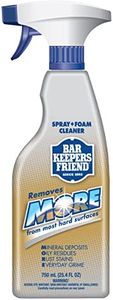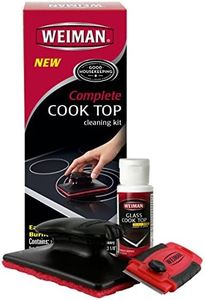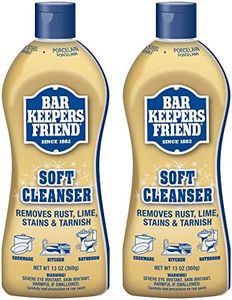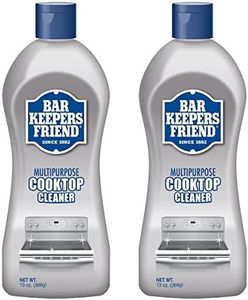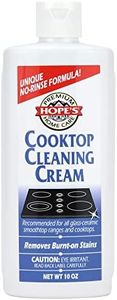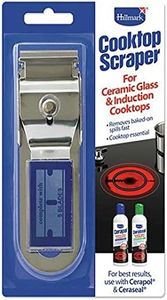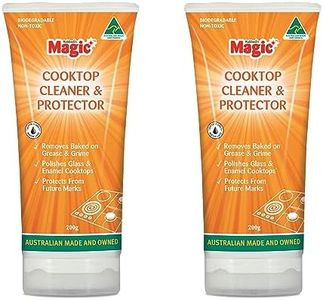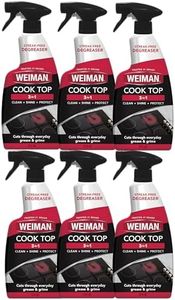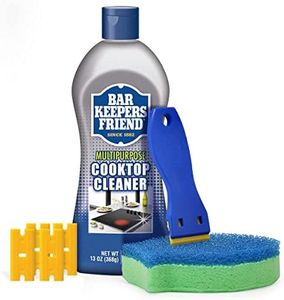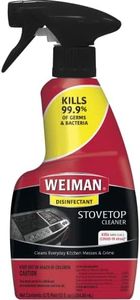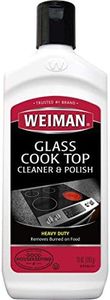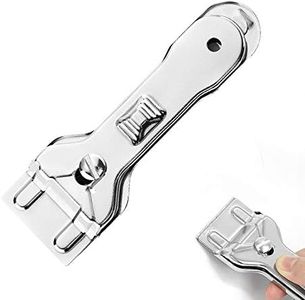We Use CookiesWe use cookies to enhance the security, performance,
functionality and for analytical and promotional activities. By continuing to browse this site you
are agreeing to our privacy policy
10 Best Glass Cooktop Cleaners
From leading brands and best sellers available on the web.By clicking on a link to a third party's website, log data is shared with that third party.
Buying Guide for the Best Glass Cooktop Cleaners
Choosing the right glass cooktop cleaner can make a big difference in keeping your stovetop spotless and protected from scratches or stains. Glass cooktops need gentle yet effective cleaning to remove spills, burnt-on residue, and grease without damaging the surface. Understanding the main features of various cleaners will help you match the product to your cleaning habits and your cooktop’s specific needs.Cleaner TypeThe type of cleaner refers to the product's form, such as a cream, spray, or wipes. Cream-based cleaners are generally more effective at removing tough, baked-on residues since they can be worked in with a soft cloth or pad. Sprays are quick and convenient, ideal for everyday cleaning or maintenance after light cooking. Wipes are the most convenient for spot cleaning or when you're in a hurry, but may not be powerful enough for tougher jobs. Think about how often your cooktop gets dirty and how much elbow grease you want to use; choose a cream for heavy-duty, a spray for routine cleaning, or wipes for quick touch-ups.
AbrasivenessAbrasiveness measures how much scrubbing power a cleaner has, which is important because glass can scratch easily. Most glass cooktop cleaners are formulated to be non-abrasive, but some may have mild abrasives or recommend special pads. Non-abrasive cleaners are safest for regular use and for sensitive surfaces, while lightly abrasive options can tackle really stubborn stains but should be used sparingly. If your cooktop is mostly clean with the occasional spill, stick to non-abrasive formulas; if you frequently deal with burned-on messes, look for a cleaner that mentions it can handle heavy residue safely.
Streak-Free FormulaStreaking happens when a cleaner leaves a visible film or lines after wiping. Some formulas are designed to evaporate cleanly, leaving a shiny, streak-free finish. This is important if you like your cooktop to look spotless or if you notice residue after previous cleanings. For those who want a showroom shine and easy cleanup, prioritize products labeled as 'streak-free' or with customer feedback about a streakless finish.
Residue and Rinse RequirementSome cleaners require thorough rinsing or wiping with a wet cloth to remove all the cleaning residue, while others are designed for wipe-and-go use. Residual cleaner can dull the look of glass and possibly affect future cooking, so it's important to consider how easy it is to completely remove the product. If you prefer fast cleaning or have limited time, pick a cleaner with a low-residue, no-rinse formula. If you don't mind a couple of extra steps for a deep clean, cleaners that recommend a follow-up rinse are still a good option.
Scent and SensitivityThe smell of the cleaner and whether it contains harsh chemicals can affect your choice, especially if you have allergies or sensitivities. Some products have strong citrus or chemical scents, while others are fragrance-free or use milder ingredients. If you’re sensitive to smells or want to keep the indoor air fresher, look for low-odor or unscented options. Families with small children or pets may also prioritize gentler, less toxic formulas.
Pad or Tool CompatibilityCertain glass cooktop cleaners are meant to be used with specific pads or scrapers and may even come with these accessories. Pads help distribute cleaner and add gentle scrubbing action, while plastic scrapers can lift off stubborn spots without scratching. Consider how you like to clean—if you prefer to avoid extra tools, look for cleaners marked as 'no tools required.' If you want a complete solution and don’t mind a couple of extras, a kit that includes a pad or scraper can give you better results for tough messes.

